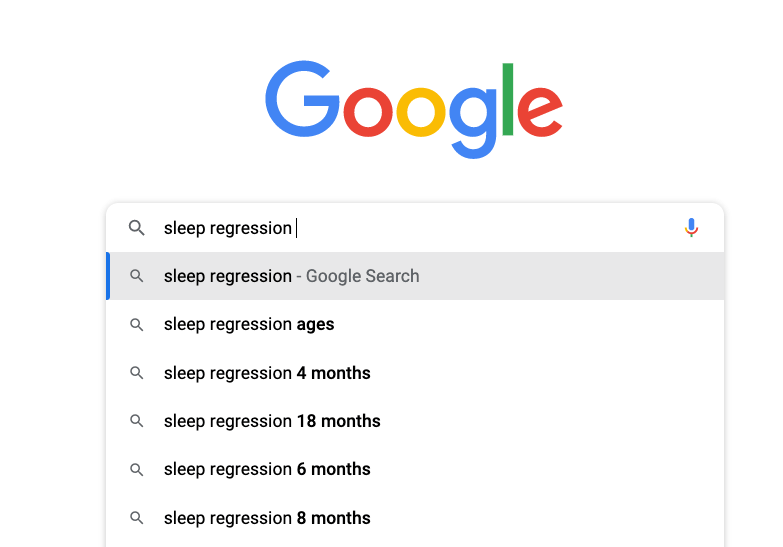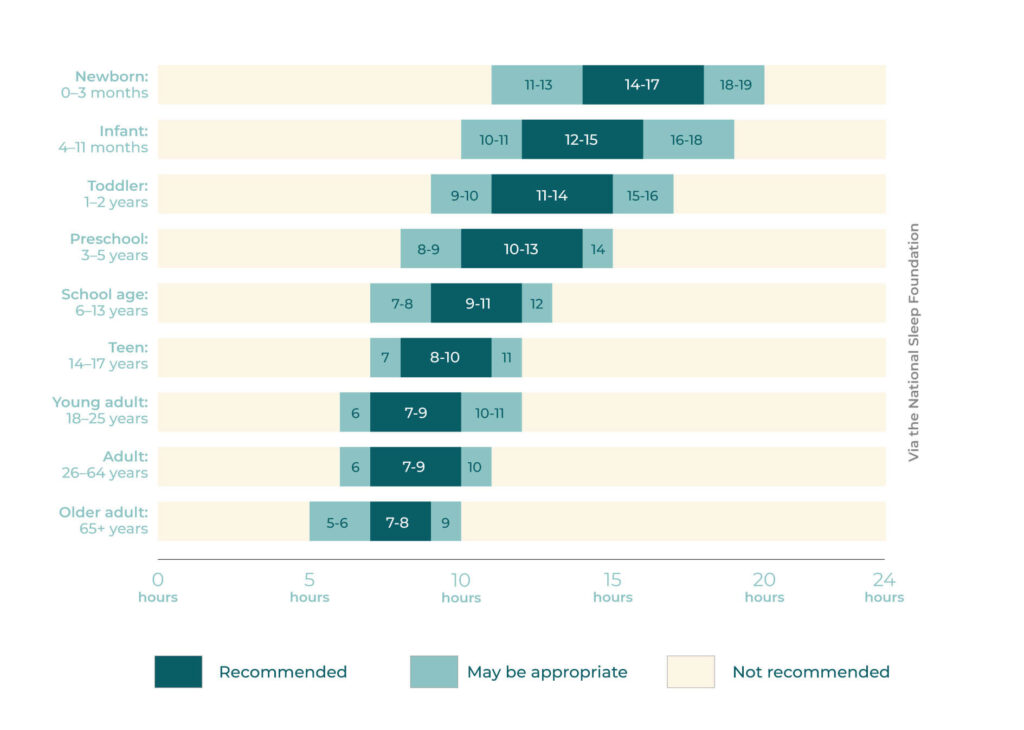In my paediatric practice, I commonly see the perfectly happy, settled baby who is sleeping beautifully overnight – but then reaches 4 months of age and the wheels seem to fall off.
Some speak of the 4-month sleep regression, like it’s some cruel rite of passage that all parents must simply endure. I’m here to tell you it’s not.
When do baby sleep regressions happen?
Search google and you’ll find any number of ages where sleep regressions are likely to occur 4 months, 6 months, 8 months, 18 months…

The truth is – there is no such thing as a 4-month sleep regression.
Yes you heard me, whether it’s 4-6-12-18 months. While sleep deterioration can occur from time to time there is always something driving the unsettled behaviour – it’s not something you have to suffer through, it’s an opportunity for us to help our babies.
It infuriates me when parents are advised that this is a real thing, this deterioration of the feed/sleep routine you’ve worked so tirelessly to achieve.
“Sleep regressions” traditionally describe a deterioration of a baby who was otherwise settled and sleeping well, that suddenly:
- has trouble self-settling
- won’t Fall Asleep independently
- can no longer link sleep cycles
- is taking frequent short naps and feeds
- becomes increasingly fussy overnight
- has difficulty falling asleep
- is generally “fighting sleep”
- decreased total sleep across a 24 hour period

There is absolutely NO necessity for babies to become unsettled and have sleep problems
at 4 months of age and there is definitely NO developmental ‘leap’ that explains this collapsing of a beautiful overnight routine (see my critique of The Wonder Weeks).
4 months is a beautiful age – it should not be feared – it’s one of my favourite developmental stages – where babies begin to babble with early verbal communication, they respond excitedly to play and they reach out to touch your face or grab at toys.
That doesn’t sound like regression to me!

What causes baby sleep “regressions”?
It’s not lost on me I’m still using the word regression here but understanding “regressions” is similar to my entire philosophy as a paediatrician and specialist in unsettled babies and baby sleep…
…we always need to look for the cause of the unsettled behaviour.
A number of factors can cause a baby or child’s sleep patterns to change or deteriorate at any age
- A growth spurt which will make your baby hungrier
- Developmental changes (both physical and cognitive)
– these will be different for every baby/child (don’t follow an app to tell you when your baby is having a “LEAP” or a developmental change!!) always watch your baby - Illness (where hydration & comfort become the focus), see my blog on managing sickness and sleep
- Discomfort: itchy tags, being too hot or cold/ or uncontrolled eczema are the most common things I see
- Disruptions in routines: like starting daycare or a new sibling arriving
- Changes to room environment: unswaddling, travel, moving to own room, big bed etc.
- Teething pain: although this is short lived
- Separation anxiety which may start around the 10-12 month mark
- As your baby progresses into the toddler years nightmare and night terrors may play a role
- Age appropriate day sleep or sleep schedule: this is a huge one. Our babies and toddler sleep patterns and requirements change regularly and their day sleep needs to adjust, – the sleep program includes age appropriate routines for all age groups Toddler sleep patterns
When you understand the changes happening at any age – you get a clearer idea of how to manage things correctly and overcome them.
A few small changes are often all that is required for you one step closer to having your baby truly sleep through the night, from 7pm to 7am.
What happens to babies at 4 months?
Around the 4 month mark will signify major developmental changes for babies – remember this timing will be different for every child.
Sleep cycles will change here, becoming more adult-like, with less time in deep, REM-sleep and more time in light sleep which can make linking their next sleep cycle problematic.
This coincides with a really big growth spurt, both physically and cognitively.
With a growing body and growing mind, babies become far more alert to their surroundings.
- Some babies might get bored with feeding after 10 minutes
- they might start to dislike being placed backwards in a car-seat or stroller,
- they may even start to talk to themselves or play with their hands when they were previously sleeping soundly.
Their growing body will often learn to roll during this period – which will mean more activity and that you will no longer be able to swaddle them for sleeps, their little cocoon will go – a huge change to their sleep environment! (NB: There are lots of tips in the sleep program to manage un-swaddling.)
Don’t be disheartened by these changes – they represent brilliant developmental progression!
The exact opposite of regression; these changes should be celebrated.
But to do all this new stuff, your baby is going to require a lot more energy.
The only way to get more energy is to eat more food, to take in more calories.
The amount of energy a baby can get from milk every feed is limited by the size of their stomach, meaning the only way to give them more energy through milk is to add another feed, and the only time available to do this is overnight.
Introducing solids around the four-month mark has a number of benefits.
- Firstly, it can take several weeks of practice before your baby is confidently taking decent volumes of solids at each meal, meaning it could be a while before they’re taking in enough calories to provide adequate energy to last the night.
- Secondly – international allergy guidelines point to strong evidence that we can reduce the lifetime risk of allergies by introducing common allergens (triggers) in a window between 4 to 6 months. Delaying solids has the potential to increase the chances of having allergies to things like nuts, eggs or fish.
When is my baby ready to start solids?
You’ll know it’s time to start introducing solid foods because your baby will start to tell you!
Many parents will delay starting solids thinking their child needs to be sitting independently but the truth is there are many signs of solids readiness and they only need head control not independent sitting to kick off.
Things to look out for include:
- more head control,
- increased saliva production (drooling),
- better oro-motor coordination (lessening of newborn tongue-thrust),
- relaxing of the gag reflex,
- tracking of your mouth when you eat solids in front of them
- and the fine and gross motor skills of bringing objects across their midline and toward their mouth.
Remember at this age solids should add to – not replace – milk feeds.
Breastmilk, formula, or a mix of the two are still the primary source of nutrition for your baby.

Why is tummy time important for minimising the 4 month “sleep regression”?
Your baby learning to roll is a major milestone and incredibly important for development, celebrate, don’t lament this.
Tummy time is really important for 2 key reasons:
- Getting stuck in the cot on their tummy
– If your baby has say learnt to roll back to front and is now sleeping unswaddled we need to teach them to roll front to back so they can settle themselves in their cot and not get “stuck” on their tummy - Neck control for starting solids
– Tummy time will help strengthen everything and increase readiness for solids – so you can get them those extra calories they are craving

Tips for managing “Baby Sleep Regressions”:
- Understand what is driving the unsettled behaviour and never dismiss it as a “LEAP” or something that can’t be resolved
- Room environment: you’ll find all this tips for every age group in the program
- Age appropriate day sleep & a consistent bedtime routine – you’ll find these in the program
- Good sleep habits and hygiene: strong foundations are key
- Regardless of the Sleep training method you shoes – Consistency patience and persistence are key
Will all babies have “sleep regressions”?
No, research has shown that there is significant variation in infant sleep – not all babies will go through this. Some babies may have no detectable sleep changes at 4 months while some may see a deterioration around this age (see all the reasons listed above).
In my experience when parents are empowered with the knowledge to always look for what is driving the unsettled behaviour will approach the problem looking for solutions rather than despair that this is a period they just have to suffer through.
Changing the vernacular around “regressions”
If we start to look at regressions as developmental progressions it can start to change the way we look at and approach these topics.
Start asking yourself:
- What has changed in my baby lately?
- What new things are they doing?
- What are the developmental milestones in your baby’s age category
- What has changed in my baby’s sleep environment?
- Are they on an age appropriate sleep routine?
- What might these changes mean? E.g. they are hungrier, transitioning out of a swaddle etc.
- What can I do to support my baby through these changes?
Remember:
- There is always something driving the unsettled behaviour.
- What has traditionally been described as a regression is actually a progression.
- As they grow and develop, it’s up to us as parents to observe our babies and better understand what they need from us.
Parents – you got this!



